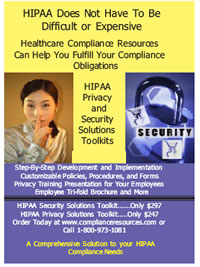The Deficit Reduction Act of 2005 - What Does it Mean to Healthcare Providers?
Date Posted: Friday,
March 31, 2006
President Bush signed the Deficit Reduction Act of 2005 on February 8, 2006. This law, like most passed by our legislature encompasses everything but the kitchen sink. Titles V and VI effect the Medicare and Medicaid systems and the bottom lines of healthcare providers.
Some of the provisions that will have the greatest impact to healthcare providers beginning January 1, 2007 involve a multiple-procedure adjustment for imaging services, reducing payment of imaging services to the hospital outpatient department fee schedule (PPS) amounts, limiting payments for procedures in ambulatory surgical centers to the hospital outpatient department (PPS) fee schedule, providing coverage for ultrasound screening of abdominal aortic aneurysm under certain medically necessity criteria, and making the deductible non-applicable to colorectal screening exams. The payment timeframe for claims not submitted electronically to Medicare after January 1, 2006 was increased from 26 days to 28 days. In addition the funding for the Medicare Integrity Program for fiscal year 2006 was increased to $100 million.
Title VI concerns the Medicaid Program and one of the most significant additions to the list of regulations appears in Chapter 3. This section, titled Eliminating Fraud, Waste, And Abuse In Medicaid, begins with encouraging states to enact a false claim act that provides the for qui tam action, equal civil fines/penalties and a minimum of 60 days for any action to be sealed by the State Attorney General.
 In addition, beginning January 1, 2007, any entity that receives or makes at least $5 million in annual Medicaid reimbursements must:
In addition, beginning January 1, 2007, any entity that receives or makes at least $5 million in annual Medicaid reimbursements must:
1. Establish written policies for all employees of the entity (including management), and of any contractor or agent of the entity, that provide detailed information about the False Claims Act including the administrative remedies for false claims and statements, any State laws pertaining to civil or criminal penalties for false claims and statements, and whistleblower protections under such laws, with respect to the role of such laws in preventing and detecting fraud, waste, and abuse in Federal health care programs;
2. Include as part of such written policies, detailed provisions regarding the entity's policies and procedures for detecting and preventing fraud, waste, and abuse; and
3. Include in any employee handbook for the entity, a specific discussion of the laws, the rights of employees to be protected as whistleblowers, and the entity's policies and procedures for detecting and preventing fraud, waste, and abuse.
In essence, this changes "strong encouragement" to a requirement to develop and implement compliance programs.
As added incentive, this law has mandated the establishment of a Medicaid Integrity Program to further the protection of the Medicare/Medicaid Trust Fund. This will be modeled after the existing Medicare Integrity Program. It includes a provision for the Secretary (of Health and Human Services) to increase the number of employees whose duties consist solely of protecting the integrity of the Medicaid program by 100 FTE�s. This will be accomplished in part by funding provided in the law which is: Fiscal year 2006--$5,000,000; for each of fiscal years 2007 and 2008--$50,000,000; and for each fiscal year thereafter--$75,000,000. This is not the only funding allotted. In addition, "Out of any money in the Treasury of the United States not otherwise appropriated, there are appropriated to the Office of the Inspector General of the Department of Health and Human Services, without further appropriation, $25,000,000 for each of fiscal years 2006 through 2010, for activities of such Office with respect to the Medicaid program."
It appears that both the Federal and State governments will be better armed financially and in personnel assets to provide increased audits and investigations. So is the requirement for compliance programs that bad? Many healthcare entities have implemented compliance programs voluntarily and like their counterparts in other industries have found that compliance can actually cut costs, thus increasing the bottom line. The war against fraud, waste and abuse is quickly finding it's way into each and every healthcare providers' backyard. If you haven't already developed and implemented your compliance program, maybe the time has come to start!
Patricia A. Trites, MPA, CHBC, CPC, EMS, CHCC, CHCO, CHP
CEO, Healthcare Compliance Resources
800-973-1081
www.complianceresources.com
pati@complianceresources.com

